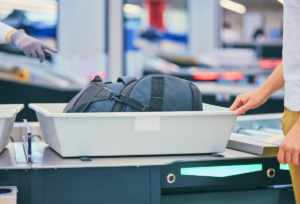Birmingham airport was closed on Friday following the crash of a light aeroplane carrying a liver for a transplant operation as it attempted to land in thick fog.
The privately-operated, two-seater Cessna was coming in to land just after 3.30pm and crashed just as it hit the runway before being engulfed in flames.
It is not yet known whether human error, mechanical failure or the harsh weather conditions contributed to the accident.
The two men onboard were injured, one critically, and the airport was closed sparking travel chaos at one of the airports busiest periods of the week.
The 58-year-old pilot was in hospital in a serious yet stable condition, with abdomen, chest and pelvic injuries.
The other passenger, in his 30s, suffered burns and back pains and was taken to Heartland hospital in Birmingham.
Director of air operations and clinical services for WNAA, Dominic Tolley, said: ‘This certainly was a challenging mission for all the emergency services involved and a good team effort.
‘The flying conditions were difficult due to the inclement weather, however, our skilled pilot did a sterling job in not only ensuring that the WNAA crew arrived at the scene swiftly and safely but in aiding the Fire and Rescue Services and the extrication of the light aircraft pilot.’
One eyewitness, Dennis Gough, was playing golf by the runway at the time and said he saw the plane coming in to land.
He said: ‘As it was coming to land it was on fire and as it approached the runway it looked like it was leaning to one side slightly.’
‘Then, once it hit the runway there were sort of flames alongside the runway then it broke into a big fireball.’
Misery for passengers was expected to continue on Saturday with scores of flights to and from Birmingham being cancelled, however the airport reopened at noon on Saturday.
Eighty flights were affected and delays were expected throughout the weekend.
It emerged that the Warwickshire and Northamptonshire Air Ambulance ambulance team entered the burning plane to cut the fuel supply line to help make the scene as safe as possible and to save the organ.
The liver was then being carried to the Queen Elizabeth hospital in Birmingham, alongside a police escort, for an immediate operation.
At Queen Elizabeth Hospital a spokeswoman described the transplant patient as ‘stable’.
She added: ‘The transplant team would like to thank the pilot of the light aircraft and his colleague for their bravery.
‘Our thoughts are with the individuals and their families. The team would also like to thank the quick-thinking of the fire and rescue teams at the scene who saved the organ.’




